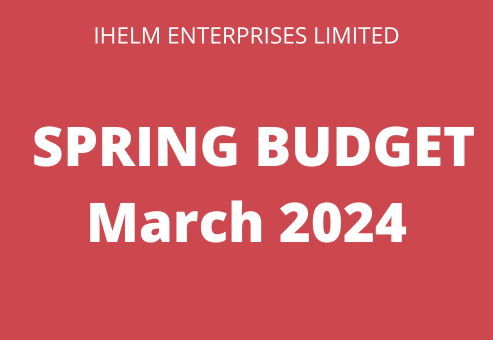On March 6th, 2024, the Chancellor, Jeremy Hunt, announced several changes during the annual spring budget. I will be looking at the announcements that will affect businesses in the UK.
- All tax rates and bands for Income Tax for those in England and NI will stay frozen until April 2028.
- Changes to National Insurance were announced and these will take place from April 6th, 2024. These changes affect all employees with category letters A, F, H, M, V, B and I and those that earn between the Primary Threshold and the Upper Earnings Limited.
The main rates of Class 1 Primary (employee) NI will reduce from 10% to 8%. The reduced rate of NI will reduce from 3.85% to 1.85%.
No changes have been made to Employer National Insurance Contributions.
Class 2 National Insurance Contributions which are paid by those who are self-employed will no longer be a required payment for those who have profits below the small profits threshold which is £6,725. However, that will mean they are not entitled to an NI credit, but they can voluntarily pay Class 2 NI which is £3.45/week. For those who are above the small profits threshold, they do not need to pay any Class 2 NI but will receive an NI credit.
Class 4 National Insurance Main Rate will be lowered from 9% to 6% and is charged on profits above the annual allowance of £12,570. - Further clarification has been added by the government as to what types of training costs for self-employed are allowed. Training costs can be claimed as long as it relates to the existing business area. If a sole trader is learning a new skill that is not related to their existing business, the training costs cannot be claimed against tax.
To be able to claim training costs against your profits, it must help you:
– improve skills and knowledge you currently use for the business
– keep up-to-date with technology used in your industry
– develop new skills and knowledge that relate to changes in your industry
– develop new skills and knowledge to help support your business (for example administrative skills)
You can read about various examples on the Gov.uk website. - Furnished Holiday Lets (residential properties that are let out for short-term periods (less than 31 days), the FHL scheme that is currently in place will be scrapped from 06/04/2025.
- VAT – the VAT threshold for registering for VAT is being increased to £90,000 from April 1st, 2024. The level that a business can deregister for VAT is being increased to £88,000.
- The Corporation Tax reliefs for theatre, orchestra, museums and galleries have now been made permanent and have also been reduced from April 1st, 2025.
- A new Corporation Tax Relief was announced for eligible film studios in England.
- The Research and Development Tax Relief will be combined into a new single regime from April 1st, 2024, which includes R&D Expenditure Credit (RDEC) and small or medium enterprise (SME) R&D relief.
- Capital Gains Tax on UK residential property disposals will have the higher rate reduced from 28% to 24%. This only affects properties that are not entitled to the Private Residence Relief. It will apply to properties that are exchanged on or after April 6th, 2024.
- Not directly related to tax, but it will affect all self-employed and partnerships who submit tax returns using an accrual basis, from April 2024, Cash Accounting will replace Accrual Accounting as the default method for calculating taxable profits from April 2024. You can still use Accrual Basis, but you will need to opt-out of Cash Basis accounting. You will need to select the option on the tax return when it is filed. Speak with your bookkeeper or accountant to check how your accounts have been prepared up to this stage, as it may mean additional work needs to be done on your accounts to change them.
This blog post only touches on some of the main highlights from the Spring Budget. You can read the full budget in full on the HMRC website here.

